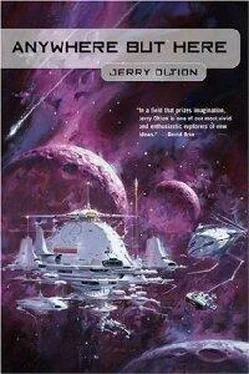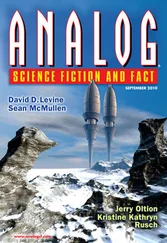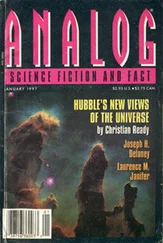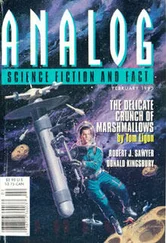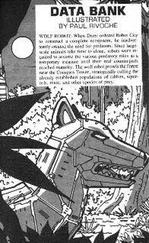Anywhere but Here
by Jerry Oltion
For the United States of America
“Our country, right or wrong. When right, to be kept right; when wrong, to be put right.”
—Carl Schurz
May we never forget the second half of that quote.
Thanks as always to the Eugene Wordos for support and inspiration, especially Ken Brady, Aurora Lemieux, Eric Witchey, Dave Bishoff, and Blake Hutchins, who made sure I sat down and wrote when I said I would by the simple expedient of coming over to my house and doing it with me.
Thanks to Elba Solano and Françoise Beniston for help with my Spanish and French. The pails I got right are theirs; any mistakes are my own.
Thanks to Jack McDevitt for the title, which he found languishing unused in my previous book, The Getaway Special .
Trent Stinson just wanted to get some cash. It was Friday evening, and he and Donna were headed downtown for their traditional “start the weekend right” dinner out. He had enough cash in his wallet for fast food, but Donna wanted to go to the brew pub tonight, and two burgers and a couple of pints of ferry beer would just about clean him out. A weekend in Rock Springs without money was about the dullest prospect Trent could imagine, so he swung by Southside National on their way downtown and parked across the street from the ATM.
“Be back in a sec,” he told Donna as he stepped out and down to the pavement.
It was a long reach. His pickup was standard equipment for a Wyoming native: three feel high at the running boards, with knobby off-road tires too big for the fenders, each wheel individually powered by a General Electric 150 superconducting motor modified with a bank of ultracapacitors for even more torque on startup.
Trent’s had been modified a bit more than most. Besides painting the body panels a deep pearlescent red and chrome-plating practically everything else, he had replaced all the glass with half-inch Lexan, oversized and set inside the frames so no amount of pressure could blow it out, and he had sealed every seam with industrial-strength adhesive. He had added extra latches to the doors to hold them tight against the extra seals he had also installed, and he had reinforced all the body panels with angle-iron to keep them from flexing. He’d welded three chrome roll bars across the outside of the cab for extra support, incidentally giving him a sturdy anchor lor the two army surplus cargo parachutes packed in separate carriers on top. In back, a homemade camper built of diamond plate aluminum looked a little like the top half of the Lunar Module that had taken Aldrin and Armstrong to the Moon half a century before. It was sealed just as tight, and he’d tested the whole works to 30 p.s.i.—two full atmospheres of pressure—before he had trusted his and Donna’s lives to it.
Those modifications had eaten up most of their bank account, but Trent figured he could take out a bit more without risking next month’s house payment. If there was a next month’s house payment. He didn’t want to stiff the loan company, but the way people were jumping off into space lately, you couldn’t give away real estate on Earth anymore. When Allen Meisner had dropped the plans for a cheap hyperdrive engine on the world, he probably hadn’t considered what it would do to the housing industry, but people were defaulting on their loans right and left, and the banks had yet to foreclose on any of them. They didn’t want to get stuck paying the taxes.
That was just the lip of the iceberg. A hyperdrive engine that cost only a couple hundred dollars in parts had changed a lot more than that. Trent’s job, for one thing. He was a construction worker, but the only houses being built these days were on planets orbiting Alpha Centauri and Tau Ceti and places farther out. There was plenty of work to be had if he wanted it, but he’d never been excited about commuting, especially when it involved a multi-light-year jump and a parachute landing. And now commuting was impossible anyway, because the federal government had made it illegal to possess a hyperdrive engine. That didn’t slop anyone, of course, but it cut down on casual trips, and it killed the one other source of income that Trent could have done: retrofitting other people’s vehicles for space. Even though it wasn’t illegal to seal up a truck, at least not yet, most people didn’t want to make themselves targets for the police, and the ones who were willing to risk it were also generally capable of doing it themselves.
The only decent prospect for work was the new civic center, which had been in the planning stages for over a year and was up for a final yea-or-nay vote at the next city council meeting, but with so many people bailing out of town, Trent didn’t expect the council to go ahead with it.
Donna Still had her job at the Mall, but it was only three days a week, and they couldn’t live on just that. They could relocate, but neither one of them were quite ready to let go of their home town. They’d made one trip out to a sun-like star about fifteen light-years away in Cetus, found some friendly aliens, and gone fishing with them, but that was just a weekend lark before the government had cracked down on such things. They’d had no intention of staying. But if Trent couldn’t find work on Earth…
The bank’s parking lot was deserted. It would normally be quiet this time of day, but there weren’t any cars on the street, either. It seemed like half the people in town had headed for the stars in the five months since Allen had made it possible, and the rest of them weren’t getting out much. The economy was in the dumper because nobody with a dead-end job was sticking around to work at it, and even though the Galactic Federation had stopped the world war that had flared up when the lid came off the pressure cooker, everybody was still afraid of terrorist bombs materializing overhead. There had been suicide bombings a couple times a month for as long as Trent could remember, but now they were coming in from overhead, and the laser satellites couldn’t stop them. Rock Springs wasn’t much of a target, but it still put a damper on people’s spirits when world tension was so high.
Trent stuck his card in the ATM and keyed in his code. He didn’t need to get a balance; he knew there were only a few hundred bucks left. Better just take out sixty or so. Not that saving some for later was all that smart, either, the way inflation was killing the value of the dollar, but Trent figured it was better in the bank than spent.
He whistled softly while he wailed for the machine to cough up the dough, and wished he’d put on his jacket. It was springtime by the calendar, but the evening air felt downright wintry.
A van pulled into the parking lot, its headlights sweeping across Trent and the ATM. The driver didn’t go for a parking spot right away, and Trent snatched his cash as soon as it poked out of the slot. He couldn’t see inside the van over the glare of the headlights. It could be a little old lady in there, but it could be a half dozen out-of-work trona miners looking for an easy mark. If that was the case, they’d get a rude surprise the moment they tried something—there was a .45 colt revolver in the pickup’s glove box and a laser-sighted .270 in the gun rack behind the seat, and Donna was a crack shot with either one—but Trent didn’t want that kind of trouble if he could avoid it.
The van didn’t move. Nobody opened a door. Trent shoved his cash in a front pocket and walked back toward his pickup, and then the van pulled sideways across two parking spots. Not near the ATM, but farther toward the back of the building. Now that its lights weren’t blinding him, Trent saw that it was tricked out for space, too. The owner of this rig didn’t care for show; he had just welded angle-iron across the wide spans of metal and wound the whole works with steel cable to hold it together against air pressure. It looked like a moving junk pile, but it wasn’t the ugliest ship Trent had seen.
Читать дальше
